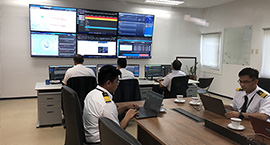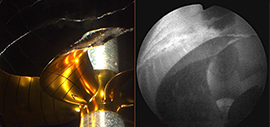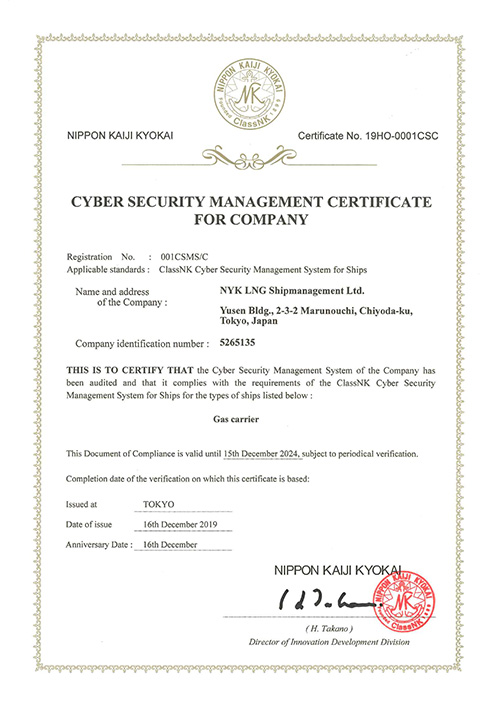DX that Supports Safe Operations
We promote "DX that supports safe operations" initiatives for solving the various issues faced by our sites by making use of digital technologies and analyzing collected data to create new value. The Group has on-site employees that turn their ingenuity into actions, and our five labs (i.e., Monohakobi Technology Institute (MTI), Japan Marine Science Inc. (JMS), NYK Business Systems Co. Ltd., Nippon Yuka Kogyo Co., Ltd., and startup Symphony Creative Solutions Pte. Ltd.) work together with one another and external partners to create solutions.
Ship Information Management System 'SIMS'
The introduction of the Ship Information Management System (SIMS) in 2008 enabled the timely sharing of data on vessels' operational status and fuel consumption between ships and offices.
Then in 2014, NYK introduced SIMS2 to the second generation and started collecting and analyzing engine plant operating data. The latest third-generation SIMS, currently being introduced, has increased the granularity of data transmission intervals to every minute, enabling more precise data acquisition.
As of the end of June 2023, 56 of approximately 200 SIMS-equipped vessels are now third-generation SIMS, and we are progressively replacing them with SIMS2.
In addition to the visualization of ship information, early detection of abnormalities in the engine plant has been achieved through data analysis on the onshore server, and a remote monitoring system has been established using Remote Diagnostic Center (RDC).
NYK will continue to pursue optimum economic and energy-saving operations through close information sharing among ships, shipowners, ship operators, and ship management companies.
<Vessels> Launching Shipmanagement Platform 'NiBiKi'
The NYK Group has developed and established a platform for sharing data of Ship Management Companies called "NiBiKi". The service was launched in December 2018.
Following the Safety Management System (SMS) manual, the onboard crew is required to file reports in line with our safety management to the ship management company.
The conventional operation flow, however, was observed to be inefficient, outdated, and not in line with present-day requirements.
The onboard staff must draft various reports and forms and send them via emails as attachments to the Ship Management Company to obtain approval and to share information.
The onboard staff would, thereafter, file printouts of the reports and forms for their records onboard.
This system of reporting and sharing information was also found to be inefficient, non-interactive, and inconvenient for data analysis.
Moreover, each Ship Management Company was storing data independently.
NYK Group took an innovative approach to resolve this issue by developing NiBIKi (NYK's Innovative Business Information and Knowledge Initiative), to keep up with the present digital age. With the implementation of NiBiKi, NYK Group has digitized 'SMS Manual and Circulars' and the applications and approval workflow.
This gives the onboard staff and ship managers a platform to easily report and share information.
Just filling up prescribed easy-to-use forms, allows ship staff to request approvals without any ambiguity.
All activities like submitting, reviewing, and approving reports and forms are recorded, with the name and rank of the responsible person, and the action taken time stamp.
Furthermore, the NiBiKi system provides a very efficient way to capture and gather data, this enormously valuable information is presented to the Ship operators and Ship Management Companies for high-quality big data analysis to enhance safe operation.
Going forward, we have plans in place to build a more comprehensive and enhanced system to utilize these analyzed data to impart crew training and drills, efficient procurement, and accounting.

<Operations Management> Establishment of Remote Diagnostic Center (RDC)

As part of digital ship management, RDC was established in August 2020 within NYK-Fil Maritime E-Training Inc. in the Philippines. It monitors the engine plant from shore for approximately 200 SIMS-equipped vessels.
RDC Experts analyze the abnormal behavior of engine data detected by anomaly detection systems in the light of their own knowledge and experience as marine engineers, and the results of the analysis are reported to vessels and ship management companies.
The system will contribute to the elimination of serious accidents and fuel savings on NYK-operated vessels by analyzing ship operation data based on the 'Expert-in-the-Loop' concept, in which AI and humans work together.
<Construction Sites> Building Environmentally Friendly Vessels 'High-efficiency Propellers'

NYK, together with MTI Co., Ltd. and Furuno Electric Co., Ltd., has developed sensors to measure the flow of water around ship in opeation. The collected data is shared with Nihon Shipyard Co., Ltd. for analysis and utilization. Using the simulations reflecting actual ship, we have designed a more efficient propeller that reduces CO2 emissions by about 2%. Similar measurements were conducted on a large crude oil tanker delivered in 2020, and improvements were made to the shape of the stern appendages on subsequent newbuildings of the same type, resulting in a reduction in CO2 emissions of approximately 2%. We plan to continue this research and expand it to other types of vessels in the future. We will utilize this full-scale simulation technology to designing hull forms as lower resistance toward 2050.
- More Information:
Autonomous Navigation Technology R&D
Advanced systems integration is essential for safe navigation, improved efficiency, and a reduction in crew workload. NYK, MTI Co. Ltd., and Japan Marine Science Co. Ltd. are openly collaborating with global players in the maritime industry and other industries, including the systems industry, to realize autonomous vessels equipped with systems having advanced processing capabilities for the benefit of crew members.
- More Information:
-
- NYK and MTI Participating Projects Selected as Support Projects for R&D in Advanced Safety Technology of Vessels by MLIT
- NYK Releases Partial Findings in Study on Avoiding Collisions
- NYK's Avoidance Navigation Research Employing AI Receives Support of MLIT
- NYK Conducts World's First Maritime Autonomous Surface Ships Trial
- NYK Successfully Tests Remote Navigation of Tugboat
- The NYK Group Conducts Demonstration Test of Collision Avoidance Navigation Research Employing AI
- Project for Evaluating and Verifying the Automatic Navigation System and Developing Element Technologies Started
- New Crewed Autonomous Navigation System Installed New Domestic Coastal Vessel 'Shiranami' for JERA
Fully Autonomous Ship Initiatives –– Participation in MEGURI 2040
Since March 2020, the NYK Group has participated in the Joint Technological Development Program for the Demonstration of Fully Autonomous Ships under the MEGURI 2040 fully autonomous ship project administrated by the Nippon Foundation.
Specifically, three of our group companies –– NYK, Japan Marine Science Co., Ltd., and MTI Co., Ltd. – are part of the DFFAS (Designing the Future of Fully Autonomous Ships) consortium with over 30 companies and organizations that have jointly developed an uncrewed navigation system under the "Joint Technological Development Program for the Demonstration of Autonomous Ships." In February 2022, the consortium conducted the world's first demonstration experiment for autonomous long-distance coastal voyages by commercial ships, including in congested sea areas.
The unmanned navigation system was able to complete a series of voyages from the port of Tokyo to Tsumatsusaka, a round trip of approximately 790 kilometers. The journey included departure from shore, navigation within the bay, coastal navigation, and berthing maneuvers.
Furthermore, we are currently participating in the DFFAS Plus Consortium, which is implementing a successor program for the social implementation of uncrewed vessels, together with the Nippon Foundation and the 51 domestic consortium members. This program aims for the full-scale practical application of uncrewed ship technology by 2025.
- *Seas with extremely heavy vessel traffic
- More Information:
-
- NYK to Participate in Crewless Maritime Autonomous Surface Ship Trial Project
- Fleet Operation Center Completed for Crewless Maritime Autonomous Surface Ship Project
- NYK Group Companies Participate in Trial to Simulate the Actual Operation of Fully Autonomous Ship
- Three NYK Group Companies to Participate in Second Stage of the Nippon Foundation's MEGURI2040 Fully Autonomous Ship Project
Promoting Innovation in the Maritime Industry
Investment in fundamental big data technology and involvement in active development are indispensable for achieving safe, economical, and environmentally friendly operations. The Group will promote a safe and efficient onboard IoT platform, in addition to digitalization initiatives, for innovation with shipbuilding companies, equipment manufacturers, ship classification societies, and various partners.
- More Information:
-
- NYK and DNV GL Cooperate to Unlock the Potential of Maritime Data
- NYK and Dualog Enters into Strategic Partnership for Joint Innovation
- NYK Group and Norwegian Partner Dualog Begin Collaboration with NTT Group for On-board IoT Innovation
- The NYK Group Teams with J-ENG to Improve Ship Engine Maintenance through the Use of Operational Big Data
- Joint Test of Next Generation Onboard IoT Platform Conducted
- NYK Joins Internet of Ships Open Platform Consortium
- Testbed Established for Internet of Ships Open Platform
- “K” LINE, MOL, & NYK Share Data with ONE through the Common Data Platform “IoS-OP”
- The NYK Group Conducts Demonstration Test of Collision Avoidance Navigation Research Employing AI
- Establishment of Maritime and Ocean Digital Engineering Cooperation Program at the University of Tokyo
Ship Cyber Risk Management

Regarding cyber-risk management for ships, the International Maritime Organization (IMO) approved "Guidelines on Maritime Cyber Risk Management" at its 98th Maritime Safety Committee (MSC98) meeting in June 2017 and strongly recommended that a shipboard cyber-risk management mechanism be put in place from January 2021 onward. The shipping industry has considered this recommendation to be a de facto mandate, and the NYK Group has been actively preparing to introduce such a system.
<Preparation Response Flow>
- 1April 2016 - March 2019 Participated in research conducted by the Japan Ship Technology Research Association's Maritime Cybersecurity Review Committee. Also prepared a cyber-risk management response in the SMS manual*
- 2April 2018 - March 2019 Conducted risk assessments for ships and seafarers based on voluntary certification standards issued by the American Bureau of Shipping
- 3April 2019 Begin revising the content of the SMS manual to introduce cybersecurity countermeasures on ships
- 4December 2019 Completed revision of the SMS manual
- 5December 2019 NYK LNG Shipmanagement Co. Ltd., an NYK Group company, obtained voluntary certification for its cybersecurity management system from Class NK (the first cybersecurity certification by Class NK).
We will continue to pursue certification in the future, and at the same time, we are preparing to provide training to our seafarers.
- *SMS Manual
Safety Management System manual, a manual that describes procedures and other actions to be taken by crew members to prevent accidents.
In addition, in April 2022 the International Association of Classification Societies (IACS) adopted two new unified requirements (UR E26 and E27) on the cyber resilience of ships. These new URs will require more robust cybersecurity measures for new ships from 2024 onward. For this reason, the NYK Group has been working with Dualog, a Norwegian maritime IT company, to develop a cybersecurity response system for ships. Installation on vessels began in September 2022, and in cooperation with our existing land-based security operations center, we have also been working to build a comprehensive monitoring and early response organization.

